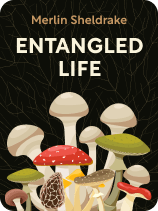

This article is an excerpt from the Shortform book guide to "Entangled Life" by Merlin Sheldrake. Shortform has the world's best summaries and analyses of books you should be reading.
Like this article? Sign up for a free trial here.
Did you know you can take magic mushrooms for depression? What are the benefits of using psychedelics for treating mental illness? Are there risks?
For years, people have been using psychedelics to treat mental illnesses such as depression and anxiety. If you think this treatment might be right for you or a loved one, check out Merlin Sheldrake’s book Entangled Life, which provides important information about using magic mushrooms for depression.
Below we’ll look at the benefits of psychedelic treatment for mental illness as well as the risks.
The Benefits of Psilocybin for Mental Illness
According to Sheldrake, there’s strong evidence that psilocybin mushrooms—also known as magic mushrooms—can effectively treat mental illnesses such as depression and anxiety. These mushrooms naturally contain psilocybin, a psychedelic compound. Human use of psilocybin isn’t new: Many indigenous cultures have used it (and continue to use it) for spiritual traditions and medicine. However, the scientific study of magic mushrooms for depression and anxiety is relatively new—most studies have been conducted in only the past several decades.
(Shortform note: Some scientists argue that research on psychedelics such as psilocybin is often exclusionary. They say that scientists who study psilocybin and other psychedelics often fail to credit indigenous people for their knowledge of and experience with psychedelics. They also critique how this research is run, arguing that white people are overrepresented among the participants enlisted to benefit from psychedelics. They propose making this field more inclusive by involving indigenous communities in designing and implementing research on psychedelics. This argument adds a new dimension to Sheldrake’s claim that we should invest more in researching fungi: We should also invest more in making that research more inclusive.)
Many recent scientific studies reveal that psilocybin offers both short-term and long-term benefits for patients suffering from mental illnesses such as depression:
- Short-term benefits: While they’re under the influence of psilocybin, patients report experiencing feelings of bliss, amazement, and connection to the universe. (Shortform note: A recent study suggests that psilocybin might also boost your creativity while you’re under its influence.)
- Long-term benefits: Patients also report having an improved outlook on life and fewer symptoms associated with depression and other mental illnesses.
How does psilocybin cause these positive effects? Research shows that this compound reduces activity in people’s default mode network (DMN), a part of the brain associated with self-awareness and self-related thoughts. When psilocybin suppresses activity in the DMN, other areas of the brain begin connecting. This changes your thinking in two main ways:
- Your ego fades. You think less about yourself (such as your identity and limits), and you instead think about the world around you and how interconnected it is. (Shortform note: One study reveals that this effect only happens if you take a medium to high dose of psilocybin; by contrast, low doses lead you to think about yourself more.)
- You “offroad” beyond your well-worn thinking pathways. For instance, if you’re typically pessimistic, you may find yourself having more optimistic thoughts.
(Shortform note: Sheldrake describes in depth how psilocybin suppresses activity in the DMN, but he doesn’t explore in depth the role psilocybin plays in the next step—the formation of new connections in your brain. A recent study involving mice found that psilocybin changed the mice’s dendrites—the part of a neuron that connects it to other cells. Specifically, psilocybin increased the number of spines extending from the dendrites, making it more likely they’ll form new and more connections with other neurons. This research suggests that psilocybin can contribute to neuroplasticity: a rewiring of the brain. This may explain, for example, how psilocybin can cause long-term changes, such as making you more optimistic.)
The Popularity and Risks of Psilocybin
In recent years, there’s been a rise in the number of cities, states, and countries legalizing or decriminalizing the use of psilocybin, making it easier for people with mental illnesses to access these long-term benefits. For example, Colorado legalized recreational psilocybin use in late 2022. Other places have legalized psilocybin for medical uses only. For instance, in early 2023, Australia made it legal for psychiatrists to prescribe psilocybin for patients with depression and PTSD.
While psilocybin is gaining popularity as a treatment, it’s not without its risks. Sheldrake extols the benefits of this substance but doesn’t explore in depth what these risks are. According to experts and psilocybin users, you can experience the following temporary states and side effects while high on psilocybin:
- Having a “bad trip,” which can make you feel anxious and paranoid. Overdosing can increase your chances of having a bad trip.
- Discomfort, such as headaches, nausea, and stomach pain
- Changes in your body, such as dilated pupils, increased heart rate, and weakness
Fortunately, these risks are unlikely to cause fatalities: As of 2020, there were no reported deaths from psilocybin use. However, experts and users still advise proceeding with caution and doing ample research before using psilocybin, especially if you have a pre-existing condition such as a seizure disorder or a heart condition.

———End of Preview———
Like what you just read? Read the rest of the world's best book summary and analysis of Merlin Sheldrake's "Entangled Life" at Shortform.
Here's what you'll find in our full Entangled Life summary:
- An examination of what we know and don't know about fungi
- How fungi can help solve many modern-day problems
- The three most important benefits of fungi






